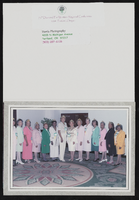Search the Special Collections and Archives Portal
Search Results

Transcript of interview with Alan Clancy by Su Kim Chung, by February 12, 2015
Date
Archival Collection
Description
Alan Clancy grew up in Sydney, Australia, the second son of famous ballroom-dancing parents. He recalls that he had incredible energy as a child, and, therefore, his parents enrolled him in the Shirley de Paul Studio to learn gymnastics, tap, ballet, and jazz. He also became a soprano singer. This training did well for him for as he went through high school he won trophies in sports and participated in musical productions. Eventually, because of a neighboring friend, Kay Dickerson, Alan moved to the Rudas Acrobatic Studio where he received further training and eventually contracted with Tibor Rudas to participate in an entertainment group called “The Las Vegas Dancers”. He was only seventeen when the group boarded a ship for Hong Kong in an enterprise which would eventually allow the dancers to entertain around the world for approximately two and a half years. When the group returned, Alan auditioned for the Tommy Leonetti television show and then for Les Girls in Sydney. Eventually Tibor Rudas appeared with a contract for Alan, when he had just turned twenty-one, to fly to Las Vegas to work in the Folies Bergere at the Tropicana Hotel and Casino. When he arrived in Las Vegas, he was surprised at the size of the city and the hotels but was overly impressed by the neon signs, the showrooms with their nude dancers, the costuming, magnificent sets, the choreography, and the dress of the patrons. He remembers his first night performing in the Folies and the amount of stars in the audience, for example, Elvis Presley, Liberace, and Zsa Zsa Gabor. Alan goes on to describe the many people that he met in Las Vegas, working in various shows, and the many friendships made over the years. However, he eventually became interested in opening his own vintage clothing store, Vintage Madness, near the Strip. He talks about his many customers, the stores around him, his creative ways of acquiring items to sell and the success that was made. Unfortunately, during the middle of one night the store burned to the ground which left Alan devastated. Eventually, however, he purchased three buildings on Fourth Street and opened an art gallery, a coffee shop, and a small stage. His mercantile interest allowed him to leave show business and briefly open a store in Laguna Beach, Southern California. It wasn’t long until Barclay Shaw asked him to work in “Splash” at the Riviera Hotel in Vegas and, therefore, he returned to show business. However, Shaw, his friend, died and so did his mother and he lost interest in his stores, renting them out. Consequently, he returned to live in California and began working with Aids patients. Alan returned to Las Vegas for the reunion of the cast of Folies Bergere and noticed the many changes made in Las Vegas from when he first arrived to perform at the Tropicana Hotel.
Text

Transcript of interview with Ronald Simone by Claytee White, May 5, 2009
Date
Archival Collection
Description
Musician Ronald Simone of Las Vegas credits his father’s guidance and his upbringing in New Haven, Connecticut, for shaping his musical and educational aspirations. Due to its proximity to New York City and the influence of Yale University, New Haven offered its residents the finest in musical entertainment; as a result, many musical greats were from or had lived in New Haven and most Broadway shows opened at New Haven’s Shubert Theater. Born in 1935 with the gift of perfect pitch, Simone began to play the piano at a young age and could play most pieces by ear. He began playing professionally at age eight in 1943 with a weekly stint on a radio show, Kitty's Revue. Still in grade school during World War II he began touring locally with an amateur producer, who formed a show that played military bases and hospitals around Connecticut and into New York and Massachusetts. In high school Simone formed his own trio and a quartet and played piano in gin mills, illegal card rooms, and resorts in upstate New York while playing trumpet in the high school band. He joined the Musicians Union at 18 and continued to play in New York and Connecticut clubs and theaters throughout his five years at Yale. During his second year at Yale the School of Music became a graduate school, from which Ron graduated in 1958. Ron’s sister Louise married one of his Yale classmates, a drummer, and the couple moved to Las Vegas. Ron visited his sister in 1959, loved the musical opportunities he saw, transferred his Musicians Union membership, and moved to Las Vegas with his friend, violinist Joe Mack, in September 1960. After sub work and playing a lounge show at the Riviera, he spent five and a half years in the Riviera showroom, moving in 1966 to the Desert Inn, where he played piano in the exclusive Monte Carlo Room for five years for the likes of Dean Martin, Sandy Koufax, Sammy Davis Jr., and Kirk Kerkorian. From there Simone went to the Dunes, where he remained for the next nineteen years working with choreographer Ronnie Lewis and rehearsing and playing all the Casino de Paris shows, line numbers, and production numbers. In July 1989, Musicians Local 369 went on strike. Because Simone was playing the Follies Bergere at the Tropicana—the first house band to strike—he was among the first musicians to walk out. Musicians at all but three Strip hotels (Circus Circus, Riviera, and the Stardust) followed. While the musicians strike lasted nearly eight months, Simone was recruited for sanctioned sub work for the duration at the Lido de Paris show at the Stardust. After the strike ended he worked with Johnny Haig's relief band playing six nights a week at various hotels.
Text

David Becker oral history interview: transcript
Date
Archival Collection
Description
Oral history interview with David Becker conducted by Claytee D. White and Barbara Tabach on May 15, 2018 for the Remembering 1 October Oral History Project. In this interview, Becker recalls being on a three-day assignment at the Route 91 Harvest Country Music Festival across from the Mandalay Bay Resort in Las Vegas, Nevada. Thinking the gunfire was produced by malfunctioning equipment, he took photos of the scattering crowd. Moments later, in a now silent venue, he realized he captured a horrific massacre. Becker recalls photographing people leaving the venue as they performed acts of heroism, helping the fallen or the slow to reach safety. He discusses how difficult it is to comprehend the acts of that night, and how his photojournalist instincts allowed him to capture such devastating images.
Text

Alpha Kappa Alpha Sorority 75th Far Western Region conference materials
Date
Archival Collection
Description
From the Alpha Kappa Alpha Sorority, Incorporated, Theta Theta Omega Chapter Records (MS-01014) -- Chapter records file.
Text

Bryan Chan oral history interview: transcript
Date
Archival Collection
Description
Oral history interview with Bryan Chan conducted by Vanessa Concepcion, Cecilia Winchell, and Stefani Evans on October 18, 2021 for Reflections: The Las Vegas Asian American and Pacific Islander Oral History Project. Bryan Chan discusses his life growing up in California, his family's migration stories to the United States, and his education. He discusses his appearance on a reality television show which led to becoming a singer for boy band LMNT. Bryan talks about his entertainment career, including his move to Las Vegas to sing and host for the Chippendales show at the Rio Hotel and Casino. He also shares insight into his family's traditions and his favorite foods that his father and grandmother cooked. Subjects discussed include: chain migration; Chippendales; giglife; virtual events; traditional foods.
Text

Marc Franco Casibang oral history interview: transcript
Date
Archival Collection
Description
Oral history interview with Marc Franco Casibang conducted by Catherine Mariano on December 5, 2021 for Reflections: The Las Vegas Asian American and Pacific Islander Oral History Project. University of Nevada, Las Vegas nursing student Marc Franco Casibang shares stories of his childhood moving with his family from Cagayan province, Philippines to different locations around the world. After their international travels, the family immigrated to the United States and lived in South Dakota and Maryland before settling in Las Vegas, Nevada in 2014 when Marc was a high school sophomore. Marc Casibang discusses his experiences as an immigrant in America, learning English and adapting to the culture of the United States, and maintaining his Filipino identity. He shares his thoughts on Filipino stereotypes, the community he and his family have found in Las Vegas, his faith, and his educational pursuits to become a nurse.
Text

Maila Aganon oral history interview: transcript
Date
Archival Collection
Description
Oral history interview with Maila Aganon conducted by Kristel Peralta, Cecilia Winchell, and Stefani Evans on June 10, 2021 for Reflections: The Las Vegas Asian American and Pacific Islander Oral History Project. Maila Aganon discusses her childhood, family upbringing, and immigration to the United States from the Philippines when she was a college student. She shares how her parents moved to Las Vegas first and Maila followed a decade later, investing in real estate and eventually taking up permanent residence. Maila talks about her employment history with Allstate Insurance, Bank of America, AAA, Caesars Entertainment, and finally Aon as a Senior Vice President. She also shares her thoughts on the growth of Las Vegas and the growth of the Asian community and cultural influence within the city. Subjects discussed include: anti-Asian violence; Filipino grocery stores; Filipino foods; remote work.
Text

"Talking Stories: A Panel of the City of Las Vegas AAPI Committee" panel discussion: transcript
Date
Archival Collection
Description
This Asian American and Pacific Islander Day panel discussion, "Talking Stories: A Panel of the City of Las Vegas AAPI Committee," features six panelists and was moderated by Allycia B. Murphy, Deputy City Attorney, Office of the City Attorney, Criminal Division. Panelists include Cynthia Leung, Chief Judge for Las Vegas Municipal Court; Jennifer Rabanes, Recreation Coordinator at Centennial Hills Active Adult Center; Patricia Cabrera, Enterprise Records Officer, City Clerk's office; Joey Boquecosa, Equipment Operator, Public Works Department; Natasha Shahani, Senior Public Information Officer; and Gai Phanalasy, Multimedia Production Specialist. The panel was held at Las Vegas City Hall on May 11, 2023, following Las Vegas Mayor Carolyn Goodman's declaration of May 11, 2023, as "Asian American and Pacific Islander Day." Anticipating the proclamation, the City's AAPI employees formed the City of Las Vegas AAPI Committee to organize the City's first AAPI Appreciation Day at City Hall. The Committee invited several local AAPI performers, organizations, and social, cultural, and advocacy groups to celebrate, honor, and recognize the City's AAPI employees across all departments.
Text

Donna Robinson oral history interview: transcript
Date
Archival Collection
Description
Oral history interview with Donna Robinson conducted by Barbara Tabach on December 20, 2019 for the Remembering 1 October Oral History Project. Robinson begins by talking about her family and childhood in Pittsburgh, Pennsylvania. She talks about her family life and how she started working at the American Red Cross as a Disaster Program Specialist. Robinson describes her first disaster situation she worked through, later disaster situations, and the different training that is required in order to handle certain situations. Robinson then begins to talk about October 1, 2017, and how she tried to help as many people as possible that night. Then she talks about the long-term effects of the shooting and how it impacted the survivors and the community. She discusses the mental health aspect of the services Red Cross had and how it still continues to serve the community today.
Text
Felicia Ortiz (Nevada Department of Education) oral history interview conducted by Magdalena Martinez and Kelliann Beavers: transcript
Date
Archival Collection
Description
From the Lincy Institute "Perspectives from the COVID-19 Pandemic" Oral History Project (MS-01178) -- Elected official interviews file.
Text
